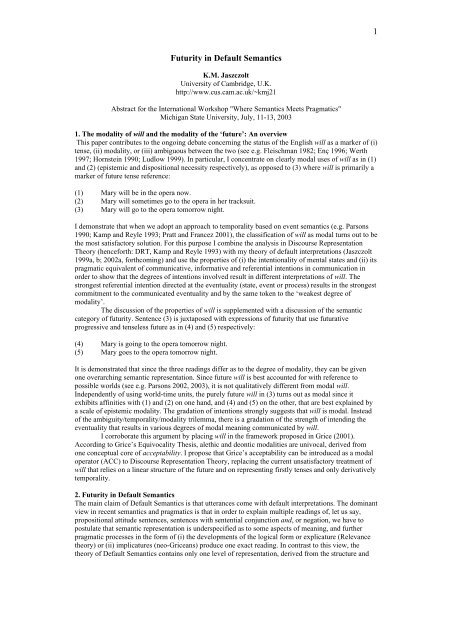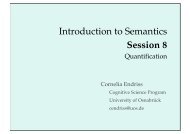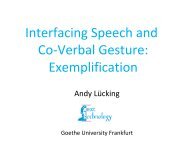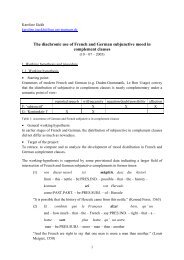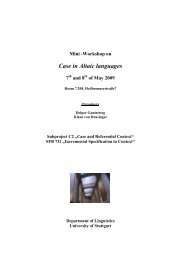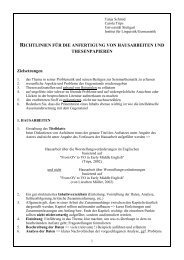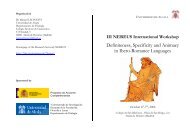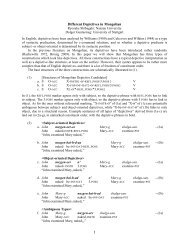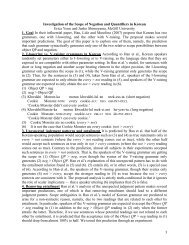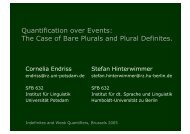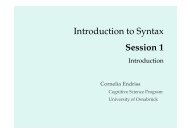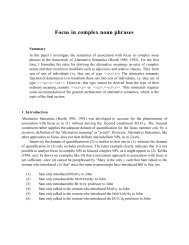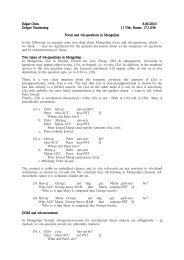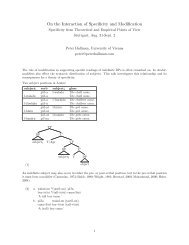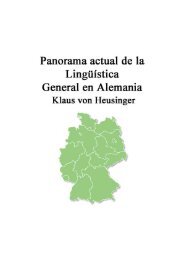SemPrag03.Progr.pdf - Institut für Linguistik/Germanistik - Universität ...
SemPrag03.Progr.pdf - Institut für Linguistik/Germanistik - Universität ...
SemPrag03.Progr.pdf - Institut für Linguistik/Germanistik - Universität ...
Create successful ePaper yourself
Turn your PDF publications into a flip-book with our unique Google optimized e-Paper software.
1<br />
Futurity in Default Semantics<br />
K.M. Jaszczolt<br />
University of Cambridge, U.K.<br />
http://www.cus.cam.ac.uk/~kmj21<br />
Abstract for the International Workshop "Where Semantics Meets Pragmatics"<br />
Michigan State University, July, 11-13, 2003<br />
1. The modality of will and the modality of the ‘future’: An overview<br />
This paper contributes to the ongoing debate concerning the status of the English will as a marker of (i)<br />
tense, (ii) modality, or (iii) ambiguous between the two (see e.g. Fleischman 1982; Enç 1996; Werth<br />
1997; Hornstein 1990; Ludlow 1999). In particular, I concentrate on clearly modal uses of will as in (1)<br />
and (2) (epistemic and dispositional necessity respectively), as opposed to (3) where will is primarily a<br />
marker of future tense reference:<br />
(1) Mary will be in the opera now.<br />
(2) Mary will sometimes go to the opera in her tracksuit.<br />
(3) Mary will go to the opera tomorrow night.<br />
I demonstrate that when we adopt an approach to temporality based on event semantics (e.g. Parsons<br />
1990; Kamp and Reyle 1993; Pratt and Francez 2001), the classification of will as modal turns out to be<br />
the most satisfactory solution. For this purpose I combine the analysis in Discourse Representation<br />
Theory (henceforth: DRT, Kamp and Reyle 1993) with my theory of default interpretations (Jaszczolt<br />
1999a, b; 2002a, forthcoming) and use the properties of (i) the intentionality of mental states and (ii) its<br />
pragmatic equivalent of communicative, informative and referential intentions in communication in<br />
order to show that the degrees of intentions involved result in different interpretations of will. The<br />
strongest referential intention directed at the eventuality (state, event or process) results in the strongest<br />
commitment to the communicated eventuality and by the same token to the ‘weakest degree of<br />
modality’.<br />
The discussion of the properties of will is supplemented with a discussion of the semantic<br />
category of futurity. Sentence (3) is juxtaposed with expressions of futurity that use futurative<br />
progressive and tenseless future as in (4) and (5) respectively:<br />
(4) Mary is going to the opera tomorrow night.<br />
(5) Mary goes to the opera tomorrow night.<br />
It is demonstrated that since the three readings differ as to the degree of modality, they can be given<br />
one overarching semantic representation. Since future will is best accounted for with reference to<br />
possible worlds (see e.g. Parsons 2002, 2003), it is not qualitatively different from modal will.<br />
Independently of using world-time units, the purely future will in (3) turns out as modal since it<br />
exhibits affinities with (1) and (2) on one hand, and (4) and (5) on the other, that are best explained by<br />
a scale of epistemic modality. The gradation of intentions strongly suggests that will is modal. Instead<br />
of the ambiguity/temporality/modality trilemma, there is a gradation of the strength of intending the<br />
eventuality that results in various degrees of modal meaning communicated by will.<br />
I corroborate this argument by placing will in the framework proposed in Grice (2001).<br />
According to Grice’s Equivocality Thesis, alethic and deontic modalities are univocal, derived from<br />
one conceptual core of acceptability. I propose that Grice’s acceptability can be introduced as a modal<br />
operator (ACC) to Discourse Representation Theory, replacing the current unsatisfactory treatment of<br />
will that relies on a linear structure of the future and on representing firstly tenses and only derivatively<br />
temporality.<br />
2. Futurity in Default Semantics<br />
The main claim of Default Semantics is that utterances come with default interpretations. The dominant<br />
view in recent semantics and pragmatics is that in order to explain multiple readings of, let us say,<br />
propositional attitude sentences, sentences with sentential conjunction and, or negation, we have to<br />
postulate that semantic representation is underspecified as to some aspects of meaning, and further<br />
pragmatic processes in the form of (i) the developments of the logical form or explicature (Relevance<br />
theory) or (ii) implicatures (neo-Griceans) produce one exact reading. In contrast to this view, the<br />
theory of Default Semantics contains only one level of representation, derived from the structure and


